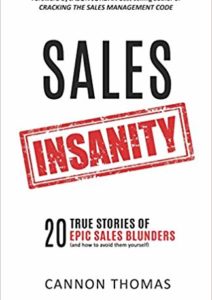Editor’s note: This blog post is part of our ongoing series of True Sales Tales.
This post is an excerpt from the new book of sales worst practices: Sales Insanity: 20 True Stories of Epic Sales Blunders
Some Context
For salespeople, encountering objections is a part of life. As prospects proceed through their buying process, it’s inevitable that they will encounter information that will give them pause. They’ll stop to question whether they should proceed with the purchase or abort the mission. In other words, they will object.
‘Objection handling’ is therefore a topic that is commonly found in sales training programs. The more prepared salespeople are to handle objections, the more comfortably and confidently they can discharge them. And while objection-handling skills are important and useful, some of the supposed wisdom that gets dispensed on the topic is laughable.
One of my favorites is: ‘It is a great sign when customers raise objections, because it shows that they’re interested.’ Umm … maybe. I think a much better sign is when they don’t object at all. That means they’re buying the story.
Another classic gem is: ‘The best way to handle an objection is just to ignore it, because the buyer will either forget they raised it, or they’ll answer the objection themselves in their mind.’ Umm … no. If your buyer raises an objection and you don’t address it, it’s not going away—it’s just going unresolved.
And this leads me to my all-time favorite insane approach to ‘handling’ objections. This one states: ‘Address all possible objections before your customer has the chance to raise them.’ Then your customer’s mind will be carefree, and those pesky objections won’t interfere with the rest of your sale. Yeah, right.
The Sales Worst Practice
I was once riding along with a well-regarded salesperson for a software company. On this particular day, he had a meeting with a prospect that he’d been pursuing for months. The meeting was with a team of mid-level managers who’d been chosen to evaluate solution providers and narrow the field to two providers. Therefore, this was a critical point in the sales cycle—if the salesperson messed up this meeting, he would be knocked out of contention.
The seller and I were discussing his plan for the meeting over breakfast that morning:
Me: So, do you mind sharing with me your agenda for today’s big sales call?
Seller: Sure. I’ll open the meeting with introductions, since I haven’t met a few of the people who will be in the room. I’ll introduce myself and then ask them to introduce themselves, telling me what they’d like to accomplish during our time together.
Me: Sounds good.
Seller: Then I’ll take five or ten minutes to address several objections that they’ll have.
Me: What objections? You will have done only the introductions at this point in the meeting. What kind of objections could they possibly raise to introductions?
Seller: No, no, no. Of course they won’t have raised any objections at that point, but I always like to go ahead and address the objections that I know they’re going to have.
Me: So, you’re going to raise their objections for them?
Seller: Sure. People always have the same objections, so I just handle them up front. That way we can get them out of the way, and they don’t sit there with the objections festering in their minds. You know, kill the monster while it’s small. That way it doesn’t grow into something you can’t defeat.
Me [willing to learn something new]: Okay. Let’s see how it goes.
True to his plan, the salesperson opened the meeting with a round of introductions and wrote the attendees’ goals for the meeting on a flip chart. He then launched his preemptive strike.
Seller: So I thought I would begin by addressing some of the concerns that you probably have regarding our company and our products.
The buyers cocked their heads slightly to the side as they looked at the salesperson standing in front of them. Clearly this was not the agenda item that they were expecting to hear immediately after the introductions.
Seller: Many people are concerned about the small size of our company relative to our much larger competitors. In fact, this will be an advantage to you if we earn your business, because we will assign a senior team to you that will be much more capable, attentive, and responsive than our competitors can provide you.
I noted a few nods around the table. Perhaps this was actually a good strategy?
Seller: You might also find that the pricing I’m going to show you toward the end of the meeting will be higher than you expect. You should know that we offer a superior product that commands a premium in the marketplace. This too should be comforting to you, because you will be purchasing the absolute best-in-class solution.
I’m pretty sure I observed shock on the face of at least one attendee. They surely didn’t see that one coming so early in the conversation.
Seller: And a few customers have told me that they found stories online questioning the security of our technology. I can assure you that our technology is as secure as any of our competition’s. In fact, I’d be happy to put you in touch with several of our current customers who have extensively tested our product and will attest to its bullet-proof security protocols.
At least two of the attendees started taking notes after this revelation. I assume they were making reminders to do some online research on the product’s security flaws. Apparently this was a hot news flash to them.
So it went for another five minutes. The salesperson must have ‘handled’ at least a half dozen objections that the buyers may or may not have had before he raised them. He told me afterward that he was happy to have killed all those monsters while they were still small, though I suspect they were small because he’d given birth to them right there in that room.
His stated strategy was to clear the buyers’ minds of all their latent objections so they could pay closer attention to his message. To the contrary, he appeared to have burdened them with a collection of new concerns to hold in reserve for later consideration. They seemed to be judging him for the remainder of the meeting, trying to decide if he was the most honest salesperson they had ever met, or just the stupidest. Either way, no sale was made.
The Lessons
Lesson 1: Don’t Assume You Know What Buyers Are Thinking
Part of the sales challenge is to uncover buyers’ needs, so you can then try to satisfy them. But you can’t pretend to know what your prospects are thinking—you have to ask them questions to uncover the truth. Making assumptions about their state of mind or their state of affairs is high-risk behavior.
Lesson 2: Never Raise Objections on Behalf of Buyers
During the course of a sale, there will be plenty of forces campaigning against you—ferocious competitors, skeptical buyers, and market detractors, just to name a few. Don’t join their team. Raising objections on behalf of your prospects won’t make you appear more proactive or credible. It will just make you appear more objectionable.











Comments (2)
Great example and spot on lesson. The sales person’s logic of, give it to them up front is tempting, but you drew out the fallacies well.
Curious about your view on positioning product / company constraints earlier in the process at the discovery phase? In a scenario of looking to qualify opportunities out for lack of ‘ideal’ fit, does offering up potential issues make more sense?
Here is an example; our level one support is fully automated and we find that it resolves 95%+ of issues. Level two issues are addressed next business day during regular hours. Is live 24/7/365 support a requirement for your organization?
Good question… Thanks for commenting. You definitely want to uncover POTENTIAL objections early in the buying/selling process, so you can redirect or minimize them – that’s just a part of good selling. What you don’t want to do is volunteer or legitimize them.
In your example, I would ask the 24/7/365 question, but I wouldn’t volunteer that ‘we address some of the issues the next day.’ They might want same day issue resolution, but it might be #10 on their list of important attributes. If you highlight it, you might elevate the importance in their minds… Best to just leave it unstated. If THEY bring it up, then you want to try to convince them it’s actually #100 on their list.
Hope that helps!